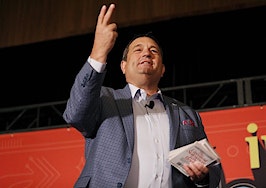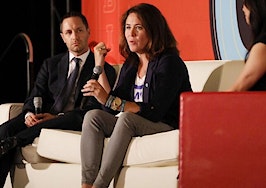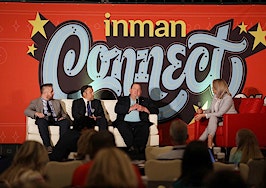“DTU”— or “dead to us”— became the humorous refrain of a Monday afternoon Thrive Broker panel at Inman Connect at the Aria Resort in Las Vegas titled “How to Compete for Quality Agents without a Huge Signing Bonus.”
In reality, the three experts on the panel agreed that top agents lured by big signing bonuses to upstart firms (read: Compass) are not, in fact, completely dead to them — even if they’re sometimes sorely disappointed by the loss of a top producer they’ve groomed.
The panel underscored the ways in which Compass’ aggressive recruitment of top agents continues to roil the industry.

Shaun Osher
“In New York City, it’s a bloody mess,” Shaun Osher, CEO of Core Group/NYC, said to appreciative whoops from the crowd. “The whole DNA of a real estate agent is getting that dollar at the closing, so it seems like a no-brainer that signing bonuses would be effective. And they have been effective. The problem I see is companies that are offering these completely irrational signing bonuses don’t have a business model to be profitable … We fundamentally believe this is a service business where we interact with people and we want to work with agents who are attracted to that. The signing bonus mentality is at the opposite end of that spectrum.”
Jereme Kleven, the owner and co-founder of Arizona-based My Home Group Real Estate, said, “[Signing bonuses] are a short-term game. Take the signing bonus in these models, and you’re going to give it back in a short period of time. But this is a long-term game to play.”

Jereme Kleven
Kleven gave the panel its rallying cry when, asked by moderator Chris Lim, founder of San Francisco-based Climb Real Estate, what he says to top producers leaving to take a big signing bonus elsewhere, he said, “I have a bit of a DTU mentality. Hopefully people want to be a part of what we’re building. If not, best of luck.”
Osher didn’t name names, but he did give numbers. He shared the fact that one top producer at Core left last year for a $1.5 million signing bonus — despite having earned $4 million in commissions with Osher’s firm the previous year.
“He hasn’t done one transaction this year,” Osher said. “That $1.5 million signing bonus was great in the moment, but over the next two, three, four years, it’s opportunity lost, it’s brand recognition lost [for that agent].”

Chris Lim
Pushed by moderator Lim on whether they’ve allowed agents to return to their firms, in violation of the panel’s humorous DTU principle, the three panelists agreed that they had, and would continue to.
“We have three examples of agents coming back,” said Joe Han, chief growth officer at Climb Real Estate. “They were really enamored by [competitors’] free snacks, free soda, and the feeling like they worked at a tech company,” he continued, to more audience laughter. “They realized they missed our company, which really understands real estate.” All three panelists agreed that non-compete agreements signed by some agents along with their signing bonuses made such reunions difficult.

Joe Han

Mark Stark
Earlier on Monday afternoon, at a Thrive panel titled “How to Compete and Retain Quality Agents,” Mark Stark, CEO and owner-broker of Americana Holdings/Berkshire Hathaway HomeServices Nevada Arizona & California Properties, and Elias Astuto, sales manager at Climb Real Estate, also offered thoughts on how to keep top agents (Compass only came up once).

Katie Kossev
Asked by moderator Katie Kossev of Houston-based Intero Real Estate what each of them might have done differently when losing a high-performing agent, Astuto said, “You’ve got to get out in front of it. When you’re reviewing quarterly numbers, don’t be afraid to have that hard conversation: ‘We know people are getting recruited heavily, are you?’ It’s a constant reselling [our agents] on everything we offer, and making sure that they use the new automation tools, to keep them excited.”

Elias Astuto
Preached Stark — whom, as Kossev observed, brought his version of Southern-preacher-speak to the stage despite not being from the South — “We’ve had five of our brokerages break away to go it alone, and three are back with us. If someone’s goal is to have their name on the sign, or they just want to break away, we want to be part of that process and that solution. We help them through the whole process. I think that’s why three of the players, when breaking away didn’t go as they expected, have come back to our organization.”
Watch the full panel discussion from Inman Connect Las Vegas.





